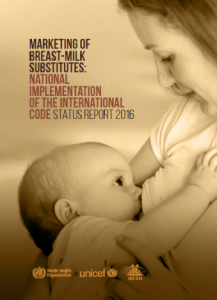
A new report by WHO, UNICEF, and the International Baby Food Action Network (IBFAN) reveals the status of national laws to protect and promote breastfeeding.
Of the 194 countries analysed in the report, 135 have in place some form of legal measure related to the International Code of Marketing of Breast-Milk Substitutes and subsequent resolutions adopted by the World Health Assembly (the Code). This is up from 103 countries in 2011, when the last WHO analysis was done. Only 39 countries have laws that enact all provisions of the Code, however, a slight increase from 37 in 2011.
WHO and UNICEF recommend that babies are fed nothing but breast milk for their first 6 months, after which they should continue breastfeeding – as well as eating other safe and nutritionally adequate foods – until 2 years of age or beyond. In that context, WHO Member States have committed to increase the rate of exclusive breastfeeding in the first 6 months of life to at least 50% by 2025 as one of a set of global nutrition targets
The Code calls on countries to protect breastfeeding by stopping the inappropriate marketing of breast-milk substitutes (including infant formula), feeding bottles and teats. It also aims to and ensure breast-milk substitutes are used safely when they are necessary. It bans all forms of promotion of substitutes, including advertising, gifts to health workers and distribution of free samples. In addition, labels cannot make nutritional and health claims or include images that idealize infant formula. They must include clear instructions on how to use the product and carry messages about the superiority of breastfeeding over formula and the risks of not breastfeeding.